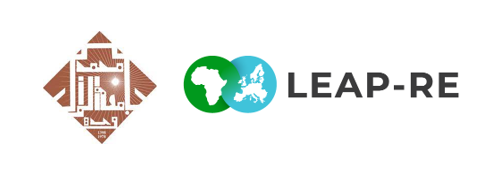University Mohammed Premier to participate in Joint European-African project to study natural hydrogen as an alternative energy source in African countries

The Long-Term Joint European Union - African Union Research and Innovation Partnership on Renewable Energy (LEAP-RE) selected for funding the HyAfrica project that will engage on research about natural hydrogen occurrence in several African countries. With a budget of nearly 1 million euros, HyAfrica is the first international research project addressing natural hydrogen exploration and exploitation, recognising the potential of this natural resource as a new energy source.
But how can naturally occurring hydrogen best be used to generate electricity for local communities? This natural hydrogen is a primary and clean energy source, continuously replenished by geochemical reactions in deep geological formations. HyAfrica (Towards a next-generation renewable energy source – a natural hydrogen solution for power supply in Africa) will investigate the possibility of the using the hydrogen that occur in specific geological environments in Africa for power production in standalone and off-grid systems for rural and isolated communities. HyAfrica aims to assess the resources of natural hydrogen in promising regions of Morocco, Mozambique, South Africa and Togo and to evaluate its social-economic impact for local communities.
HyAfrica will also engage stakeholders to identify the regulatory and licensing procedures necessary for developing hydrogen exploration in the target countries and will compare business models to other renewable and hydrogen-based solutions to understand advantages or complementarity.
Hydrogen is widely seen as essential for energy transition, with the European union and some African countries having proposed strategies that require hydrogen manufacturing from methane reforming with CO2 capture (blue hydrogen) or from electrolysis of water using renewable energy sources (green hydrogen). HyAfrica proposes a different vision: it advocates the exploitation of the hydrogen gas that occurs in geological formations and its use as a primary energy source. This constant renewable resource has the potential to be a lower cost complement to manufacturing of hydrogen, without the full-cycle inefficiencies, and impacts on land use, water consumption and raw material supply associated with industrial production of blue and green hydrogen.
Coordinated by the Portuguese SME, Converge!, a spin-off company from the University of Évora, the consortium consists of two German research institutions (Fraunhofer IEE and LIAG Leibniz Institute for Applied Geophysics), University Mohammed Premier in Morocco, University of Lomé in Togo, Universities of Limpopo and Pretoria in South Africa, and the University Eduardo Mondlane and the National Directorate of Geology and Mines in Mozambique. The project is due to start in August 2022 and will run for three years.
The LEAP-RE programme started in 2020 with the ambition to develop innovation in the field of renewable energy and to strengthen research cooperation between the European Union (EU) and the African Union (AU). It aims to increase the use of renewable energy via a well-balanced set of research, demonstration, and technology transfer projects in both continents.
For additional information, please, contact
Alae Eddine BARKAOUI | a.barkaoui@ump.ac.ma